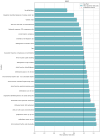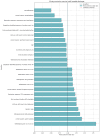Enhancing Bystander Intervention: Insights from the Utstein Analysis of Out-of-Hospital Cardiac Arrests in Slovenia
- PMID: 39202509
- PMCID: PMC11356526
- DOI: 10.3390/medicina60081227
Enhancing Bystander Intervention: Insights from the Utstein Analysis of Out-of-Hospital Cardiac Arrests in Slovenia
Abstract
Background and Objectives: Out-of-hospital cardiac arrest (OHCA) and survival is a pressing matter all around the world. Despite years of research and great strides and advancements, survival remains alarmingly low. The aim of this study was to measure the survival and characteristics of patients having an OHCA in Slovenia, with an in-depth look at how the bystanders affect the return of spontaneous circulation (ROSC) and survival of OHCA. Materials and Methods: In this observational cross-sectional prospective study, we enrolled patients between 1 September 2022 and 30 November 2022, with a follow-up period of 1 month. All OHCAs attended by the emergency medical services were included. Data were collected and analyzed according to the Utstein 2015 reporting template. Independent predictors of ROSC and 30-day survival or survival were explored using ridge regression. Results: ROSC was achieved in 41% of cases where resuscitation was attempted. The overall 30-day survival rate where resuscitation was attempted was 14%. In 13% of all cases where resuscitation was attempted, patients had a favorable neurological outcome. Using our prediction model, we found that defibrillation under 20 min and ventricular fibrillation as an initial rhythm improves survival, whilst no defibrillation and bystander full cardiopulmonary resuscitation negatively predicted survival. Conclusions: Slovenia has OHCA 30-day survival comparable to the rest of the European Union. The favorable neurological outcome is high. Our data show that bystanders do not significantly improve survival. This represents an untapped potential of general public education in cardiopulmonary resuscitation and automatic external defibrillator use. Following good practices from abroad and improving layperson CPR knowledge could further improve OHCA survival.
Keywords: Slovenia; education; emergency medical dispatch; emergency medical services; heart arrest; out-of-hospital cardiac arrest; public health; return of spontaneous circulation.
Conflict of interest statement
The authors declare no conflicts of interest.
Figures


Similar articles
-
The effect of dispatcher-assisted cardiopulmonary resuscitation on early defibrillation and return of spontaneous circulation with survival.Resuscitation. 2019 Feb;135:21-29. doi: 10.1016/j.resuscitation.2019.01.004. Epub 2019 Jan 9. Resuscitation. 2019. PMID: 30639789
-
Out-of-hospital cardiac arrest surveillance --- Cardiac Arrest Registry to Enhance Survival (CARES), United States, October 1, 2005--December 31, 2010.MMWR Surveill Summ. 2011 Jul 29;60(8):1-19. MMWR Surveill Summ. 2011. PMID: 21796098
-
Recognising out-of-hospital cardiac arrest during emergency calls increases bystander cardiopulmonary resuscitation and survival.Resuscitation. 2017 Jun;115:141-147. doi: 10.1016/j.resuscitation.2017.04.006. Epub 2017 Apr 14. Resuscitation. 2017. PMID: 28414165
-
Community first responders for out-of-hospital cardiac arrest in adults and children.Cochrane Database Syst Rev. 2019 Jul 19;7(7):CD012764. doi: 10.1002/14651858.CD012764.pub2. Cochrane Database Syst Rev. 2019. PMID: 31323120 Free PMC article.
-
Impact of dispatcher-assisted cardiopulmonary resuscitation on neurologically intact survival in out-of-hospital cardiac arrest: a systematic review.Scand J Trauma Resusc Emerg Med. 2021 May 24;29(1):70. doi: 10.1186/s13049-021-00875-5. Scand J Trauma Resusc Emerg Med. 2021. PMID: 34030706 Free PMC article.
Cited by
-
Contemporary Practices in Refractory Out-of-Hospital Cardiac Arrest: A Narrative Review.Medicina (Kaunas). 2025 Jun 7;61(6):1053. doi: 10.3390/medicina61061053. Medicina (Kaunas). 2025. PMID: 40572741 Free PMC article. Review.
References
-
- Gräsner J.-T., Lefering R., Koster R.W., Masterson S., Böttiger B.W., Herlitz J., Wnent J., Tjelmeland I.B.M., Ortiz F.R., Maurer H., et al. EuReCa ONE 27 Nations, ONE Europe, ONE Registry: A Prospective One Month Analysis of out-of-Hospital Cardiac Arrest Outcomes in 27 Countries in Europe. Resuscitation. 2016;105:188–195. doi: 10.1016/j.resuscitation.2016.06.004. - DOI - PubMed
-
- Yan S., Gan Y., Jiang N., Wang R., Chen Y., Luo Z., Zong Q., Chen S., Lv C. The Global Survival Rate among Adult Out-of-Hospital Cardiac Arrest Patients Who Received Cardiopulmonary Resuscitation: A Systematic Review and Meta-Analysis. Crit. Care. 2020;24:61. doi: 10.1186/s13054-020-2773-2. - DOI - PMC - PubMed
-
- Oving I., Masterson S., Tjelmeland I.B.M., Jonsson M., Semeraro F., Ringh M., Truhlar A., Cimpoesu D., Folke F., Beesems S.G., et al. First-Response Treatment after out-of-Hospital Cardiac Arrest: A Survey of Current Practices across 29 Countries in Europe. Scand. J. Trauma. Resusc. Emerg. Med. 2019;27:112. doi: 10.1186/s13049-019-0689-0. - DOI - PMC - PubMed
Publication types
MeSH terms
Grants and funding
LinkOut - more resources
Full Text Sources
Medical

